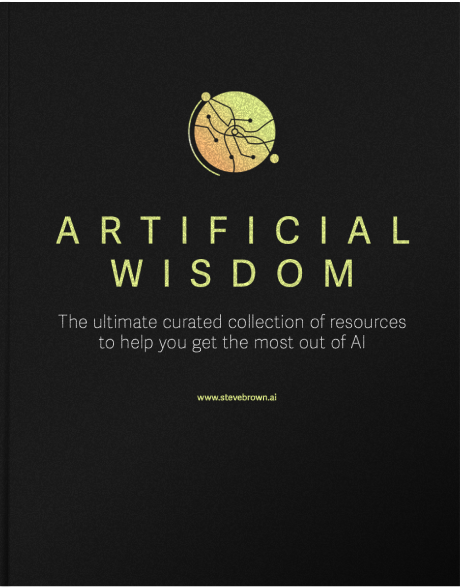AI Elevates Search to Research
AI technology continues to improve, often exponentially. It’s evolved from pattern matching, prediction, and recommendation engines to sophisticated agents capable of meaningful conversation and performing reasonably complex tasks. With each advancement, AI inches closer to becoming an integral part of our daily lives, not just as assistants but as researchers and collaborators. The change has enormous implications for users, content creators, advertisers, and the multi-billion-dollar search engine optimization (SEO) business.
The Next Big Step in AI: Researchers
Imagine an AI that doesn't just chat but actively participates in tasks requiring deeper cognitive functions. With the latest models released by OpenAI, that’s now a reality. We will get to that in a moment. First, let’s explore how AI is changing the search experience.
Recently, my wife and I were planning a trip to Budapest. My wife spent hours with Google Maps and the ten blue links of Google Search to learn about the city, popular tours, and the best restaurants. She also researched her favorite thing to experience on holiday: cool speakeasy bars. After a few hours of toil, she built a list of some fabulous places to go. By contrast, I gave ChatGPT a whirl and started a conversation with a very open-ended question: “We are about to visit Budapest and wondered what we should know about the place and the local culture before we go.” I was impressed with the quality and depth of the answer. ChatGPT told us about Hungarian tipping culture, advised us how to get around the city with public transport, recommended attractions, and shared some of the city's history. It was amazing what an open-ended question revealed right off the bat. A very natural conversation followed with ChatGPT making recommendations on restaurants, speakeasy bars, and city walks as it learned more about our interests. Within a few minutes, we gathered a ton of helpful information. We received tips on many of the same restaurant and speakeasy recommendations my wife had spent hours researching on Google. My wife and I travel a fair amount, and ChatGPT has just become my favorite new research tool. The AI wasn't just retrieving data but analyzing, comparing, and recommending options based on nuanced preferences and constraints. Our experience highlighted the transformative potential these systems hold for our future. And they are about to get a LOT better.
OpenAI o1: Reasoning Pioneer

OpenAI’s new model, o1, is a significant leap forward on the path towards human-level artificial general intelligence (AGI). Unlike traditional AI, which predominantly operates using an equivalent approach to our brain’s System 1 thinking—fast, automatic, and often subconscious—OpenAI o1 incorporates System 2 thinking. This allows the AI to use slower, more deliberate, and conscious reasoning. Integrating both systems enables OpenAI o1 to handle complex tasks requiring deeper understanding and judgment. Reasoning is a foundational capability needed to elevate chatbots into great research tools. By understanding research parameters, constraints, and detailed requirements, reasoners can take their time to ‘think’ through a research challenge, break it down into subtasks, and execute them to return with a well-researched and thorough response. OpenAI telegraphed its product roadmap direction in a memo to employees shared in July 2024. In it, they outlined five levels of AI, shown in the graphic below. The new o1 model would seem to fit neatly into the second category, reasoners.
A quick aside: OpenAI has always struggled with naming its products. After all, OpenAI famously does not open-source its models anymore, and the name ‘ChatGPT-4o’ hardly trips off the tongue. Their marketing department should probably try a bit harder. The new reasoning capability built into their o1 model (it’s ‘o1’ not ‘O1’ with a non-capitalized ‘o’ for some reason) was formerly codenamed “Strawberry,” which seems like a better name if you ask me, and before that was known internally as Q-Star (Q*). Q-Star (now o1) is reportedly the new capability that caused great concern for former OpenAI chief scientist Ilya Sutskever and led to the temporary ousting of Sam Altman and Sutskever’s eventual resignation. The incident has led to the creation of an internet meme: “What did Ilya see?”
Agentic AI: The Future Research Assistants

Agentic AI, the next frontier in AI, will bring us true research assistants. These AI systems will not merely follow instructions but will actively participate in the research process, making independent decisions and offering insights that might elude human researchers. Agentic AI with reasoning capabilities could revolutionize everything from scientific research to legal analysis. Agents will sift through mountains of data, identifying patterns and drawing conclusions at a speed and accuracy far beyond human capability. Powerful agentic AI is a big focus for all the major AI research labs as it may ultimately enable them to automate the process of AI research itself. Ex-OpenAI wunderkind Leopold Aschenbrenner shared this notion, known as the Intelligence Explosion (keying of the Cambrian Explosion term in biology), in his recent Situational Awareness paper on the future of AI.
Agentic AI Will Change How We Use Technology
The integration of agentic AI into daily tasks is easy to imagine. For example, a shopping assistant AI that understands your preferences, budget constraints, and even the ethical considerations of your purchases. The shopping agent could suggest products that align with your values, compare prices across multiple platforms, and read every single customer review. AI travel agents will soon craft personalized itineraries, taking into account your past travel experiences, preferences, interests, budget, health concerns, climate, and time of year. This AI would not only book flights, hotels, and connections but also recommend local attractions and dining options and create a packing list tailored to the destination's climate and activities.
Brave New World for Content Creators and Advertisers
As AI continues to evolve, the implications for web traffic and ad revenue are profound. With AI handling more online interactions, humans will spend less time navigating blue links and web pages. This shift means that an increasing percentage of website visitors will be machines, fundamentally changing how we measure and reward web traffic. Businesses will need to adapt to this new reality, finding ways to cater to and monetize AI visitors effectively.
SEO to AIRO?
The era of Search Engine Optimization (SEO) will quickly give way to AI Research Optimization (AIRO). Perhaps it should more accurately be called AI Reputation Optimization as the work of the future will be to convince Agentic AIs that what you’re selling is worth buying and that you’re a trustworthy source.
This new paradigm focuses on optimizing content for AI researchers and assistants rather than human users. Strategies and metrics for online success will need to be realigned to accommodate this new audience. For instance, content creators might need to focus on structured data and metadata that AI can easily interpret and utilize instead of merely optimizing for keywords.
Web Reward Model Changes
One of the critical questions in this new landscape is the web reward model. Do we reward a visit by an AI as much as a visit by a human? Traditional metrics like page views and click-through rates might become less relevant as AI interactions increase. New models must be developed to account for the qualitative differences between human and AI visits. This might involve measuring the value of the data extracted by AI, the efficiency gains achieved through AI interactions, or even the downstream impact of AI-generated insights on business outcomes.
The rise of AI as researchers and assistants is poised to reshape our technological landscape. This evolution will transform how we interact with technology, the metrics we use to measure success, the way we work, and the very fabric of our digital economy.

The unlimited curated collection of resources to help you get the most out of AI
#1 AI Futurist
Keynote Speaker.
Boost productivity, streamline operations, and enhance customer experience with AI. Get expert guidance directly from Steve Brown.
.avif)



















































.png)


.png)














.png)


.png)

